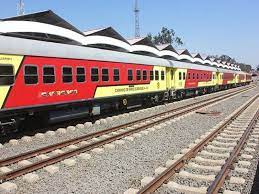It was revealed this week that a consortium that will be managed by the international commodities trader Trafigura would be in charge of running the R10.5 billion railway project that is going to link the Lobito port in Angola to the Democratic Republic of Congo and Zambia.
On Tuesday, the presidents of Angola, Zambia, and the Democratic Republic of the Congo convened in Lobito to declare that the Lobito Atlantic Railway will operate, manage, and maintain the train infrastructure for the movement of products along the 1,300 kilometres corridor for the next 30 years.
It is a consortium joint venture formed by the companies Trafigura, Mota-Engil, an international construction and infrastructure management business, and Vecturis SA, an independent train operator.
Read also: Tanzania Awards $2.2bn Contract To Build Standard Gauge Railway
The intent of the rail
The railway is anticipated to be the quickest and fastest approach to the port from the important mining district of Kolwezi in the Democratic Republic of the Congo
According to the statement,(DRC), is located in an area where exports of copper, cobalt, and other raw materials are rising rapidly. In addition to this, it will reach the copper belt in Zambia. In addition to this, Lobito will provide the region with the quickest route to Europe and the Americas for both export and import.
The other objective is to make travel on the Benguela Railway, which is primarily used within Angola, both more expedient and safer for its passengers. This will provide an alternative to the ports in east Africa that are characterised by long wait times and congestion and will be linked to a port in Lobito that is less congested.
Remarks from Angolan President as distributed by Trafigura
In a statement that was distributed by Trafigura, Angolan President Joao Lourenco expressed the hope that expanding the corridor to include Zambia would encourage more trade inside Africa.
“The Lobito Corridor, which links Angola to the Democratic Republic of the Congo and whose concession we have given today provides for its extension to Zambia, will certainly boost intra-African exports, which currently account for only 14% of the total exports for the rest of the world.
“Figures like this show us the importance and necessity of putting our infrastructure at the service of the economic and social development of our countries and our continent. And we are doing so with vision, purpose and clearly defined objectives,” he said.
According to Jeremy Weir, who works with Lobito Atlantic Railway, the company’s objective is to “create the most important logistics corridor in sub-Saharan Africa.”
In their Dar-es-Salaam Declaration, which was adopted on November 20, 2004, the heads of state for the countries of the Great Lakes Region committed themselves to cooperating in the enhancement of economic growth. They also agreed that the rehabilitation of the Lobito Corridor would link together southern Africa and central Africa while also improving access to the east African region.
However, the struggle in Angola between the National Union for the Total Independence of Angola (UNITA), which was led by the late Jonas Savimbi, and the People’s Movement for the Liberation of Angola (MPLA), which was the government party, began in the 1970s and had a severe impact on the Lobito Corridor. It was necessary to rebuild it, and one of the primary motivating factors was the signing of peace agreements.
In Angola, the Lobito Atlantic Railway will run its operations with a total of at least 1,555 waggons and 30 locomotives.
All of these would require a total investment of approximately R8.5 billion, and if the DRC side were to be taken into consideration, an additional investment of R1.8 billion would be necessary.
According to a statement released by Trafigura, the consortium intends to make an investment of up to $455 million in Angola and up to $100 million in the DRC overall.
After the addition of Zambia, the amount that will be required was not immediately stated.
